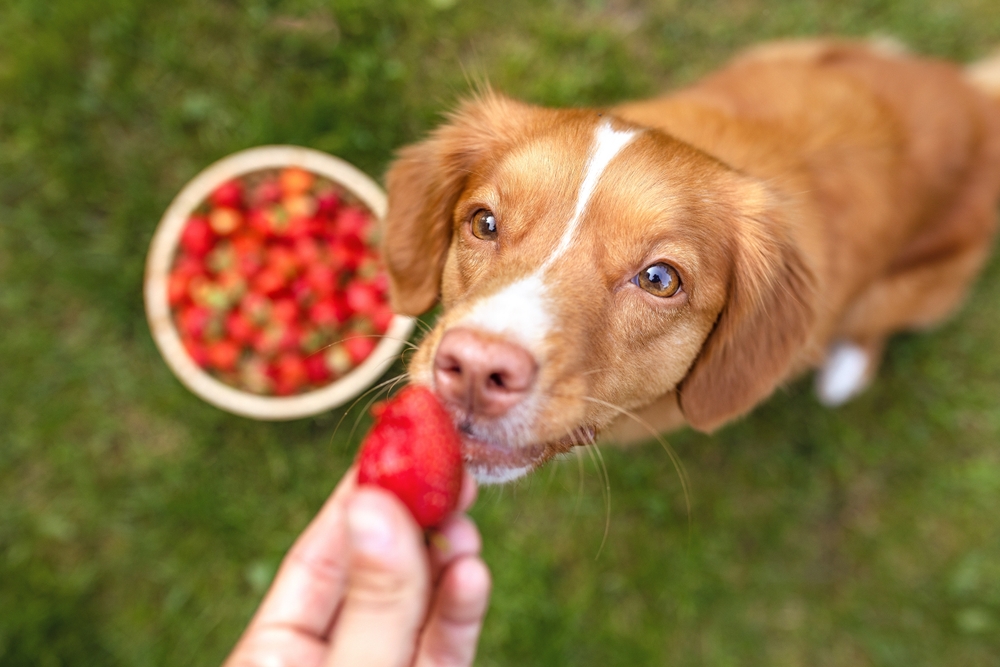The post Can Dogs Eat Pineberries? Vet-Reviewed Facts & FAQ by Melody Russell appeared first on Dogster. Copying over entire articles infringes on copyright laws. You may not be aware of it, but all of these articles were assigned, contracted and paid for, so they aren’t considered public domain. However, we appreciate that you like the article and would love it if you continued sharing just the first paragraph of an article, then linking out to the rest of the piece on Dogster.com.
Click to Skip Ahead
Pineberries, with their quirky appearance resembling strawberries but with a hint of pineapple flavor, have certainly captured attention in the fruit world. But, what if your fur baby gives you those pleading eyes when you’re enjoying them? Good news: in moderation, pineberries can be a delightful treat for dogs. As they are a hybrid between two varieties of strawberries, they are unlikely to cause any problems that strawberries do not.
Too many pineberries might upset a dog’s stomach. Thus, when introducing these unique fruits to your dog, start small, monitor their reaction, and always ensure they are chopped into bite-sized pieces to avoid choking hazards.
What Are Pineberries and How Do I Feed Them to My Dog?
Pineberries are hybrid fruits that look like white strawberries but have a flavor reminiscent of pineapples. While pineberries are safe for dogs, it’s best to give them in moderation. A few small pieces once or twice a week is a good guideline, but always consult with your veterinarian for personalized advice.
Always wash the berries thoroughly. To avoid potential choking hazards, dice the pineberries into bite-sized pieces before serving them to your dog. While pineberries are not toxic, eating them in large quantities might upset a dog’s stomach. Monitor your dog for any signs of digestive distress, and if you’re concerned, consult with your veterinarian.

Benefits of Pineberries for Dogs
Now that you know that these fruits are safe to offer to pets, we bet you’re wondering if there are any benefits to including them in your pet’s diet.
- Fiber: Pineberries are high in fiber, helping your dog to feel fuller for longer.
- Folate: Folate has plenty of health benefits and tends to be beneficial for their skin, fur, immune system, and cognitive health.
- Vitamin A: This is an essential vitamin. It can help create a health coat and boost health for bone, vision, and immune health.
- Vitamin C: This vitamin helps boost energy levels and fights illness-causing free radicals.

What Other Fruits Are Safe for Dogs?
While pineberries can be a safe and tasty treat for your dog in moderation, they aren’t always easy to come by. So, what are some more common fruits that could be included in your pet’s diet?
- Strawberries
- Blueberries
- Bananas
- Raspberries
- Watermelon
- Blackberries
Most of these fruits are rich in vitamin B, C, and K. However, remember that fruits are full of sugar, so your dog shouldn’t have too much. A good rule of thumb is that treats should make up less than 10% of your dog’s daily caloric intake.

Fruits to Stay Away From
Dog owners should stay vigilant, as there’s a slew of fruits that can harm their furry companions, including grapes, unripe tomatoes, and citrus fruits. One of the most dangerous fruits you can offer your pet is grapes (and also raisins). These are toxic to dogs and even tiny amounts could have serious consequences.
As already noted, several fruits are dog-friendly like banana, strawberries, raspberries, and blueberries, but moderation remains the rule of thumb. On a side note, while fresh fruits, including pineberries, are fine, remember to steer clear of canned fruits and those drenched in syrup for your pup. It’s a no-go, especially if it contains xylitol, an artificial sweetener toxic to dogs.
Another thing to keep in mind is that not all parts of fruits are safe for dogs. For example, you need to avoid the seeds, stems, and core of apples since they contain trace amounts of cyanide compounds, while also avoiding the pits of stone fruits, such as peaches and cherries. As a general rule, you should avoid the seeds and pits of all fruits, as all of them are choking hazards.

Conclusion
Pineberries not only excite our taste buds but also intrigue our pets. They are a tasty treat in small amounts but as with any other food, there are protocols to follow.
Firstly, always consult with your veterinarian about any new addition to your pet’s diet. Ensure the pineberries are fresh, firm, and stored properly. Before serving, wash these berries thoroughly and dice them up to prevent choking. And while it may be tempting to offer a generous helping, it’s advisable to limit pineberries to a few small pieces once or twice a week.
Monitor your dog for any unusual behavior or reactions after they eat them. With the right precautions, pineberries can be a refreshing, occasional treat for your canine friend.
Featured Image Credit: Brent Hofacker, Shutterstock
The post Can Dogs Eat Pineberries? Vet-Reviewed Facts & FAQ by Melody Russell appeared first on Dogster. Copying over entire articles infringes on copyright laws. You may not be aware of it, but all of these articles were assigned, contracted and paid for, so they aren’t considered public domain. However, we appreciate that you like the article and would love it if you continued sharing just the first paragraph of an article, then linking out to the rest of the piece on Dogster.com.



